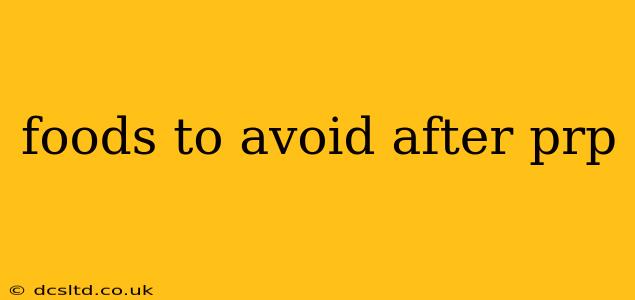Platelet-rich plasma (PRP) therapy is increasingly popular for its regenerative properties, used to treat various conditions from hair loss to joint pain. While PRP itself is derived from your own blood, making it generally safe, your diet plays a significant role in optimizing the treatment's effectiveness and minimizing potential complications. This guide details foods to avoid after PRP treatment to ensure optimal healing and results.
What is PRP Therapy and Why is Diet Important?
PRP therapy involves drawing your blood, processing it to concentrate platelets, and then injecting the platelet-rich plasma into the targeted area. These platelets are rich in growth factors that stimulate tissue regeneration and healing. However, certain foods can hinder this process, either by increasing inflammation, interfering with blood clotting, or slowing down healing. A well-managed diet after PRP treatment is crucial for maximizing its benefits.
Foods to Avoid After PRP Treatment:
Several food groups and specific items should be limited or avoided after PRP treatment. This isn't about strict elimination, but rather mindful consumption to support healing.
1. Inflammatory Foods:
Many foods trigger inflammation in the body. Since PRP aims to reduce inflammation and promote healing, minimizing these foods is crucial. These include:
- Processed foods: High in unhealthy fats, sodium, and additives, these contribute to systemic inflammation.
- Sugary drinks and foods: Excess sugar fuels inflammation and can impede the healing process.
- Red and processed meats: Rich in saturated fats, these contribute to inflammation.
- Fried foods: High in unhealthy fats and often processed, they hinder healing.
- Excessive alcohol: Alcohol is an inflammatory substance and can interfere with healing.
2. Foods that Thin the Blood:
Since PRP involves injecting concentrated platelets, consuming foods that thin the blood excessively could lead to increased bleeding or bruising at the injection site. While some blood thinning is natural and beneficial, it's best to minimize the risk post-treatment. These include:
- Vitamin K antagonists: Though Vitamin K is important for clotting, extremely high intake can interfere with blood-clotting processes. However, severe vitamin K deficiency is more likely to cause problems. It's always best to consult your doctor before making significant dietary changes.
- Excessive Ginger and Garlic: While these have many health benefits, large quantities can have a blood-thinning effect. Moderate consumption is generally fine.
- Omega-3 Fatty Acids (in excessive amounts): While beneficial overall, very high intakes of Omega-3s can contribute to blood thinning. Stick to recommended daily allowances.
3. Foods that May Interfere with Healing:
Some foods can hinder the body's natural healing process, making it harder for the PRP to do its job effectively. These include:
- High-sugar foods: Excess sugar slows down collagen production, a vital part of tissue repair.
- Foods high in saturated and trans fats: These fats can impair blood circulation and reduce the body's capacity for healing.
What to Eat After PRP Treatment:
Focus on a diet rich in:
- Fruits and Vegetables: Packed with antioxidants and vitamins that support healing.
- Lean proteins: Essential for tissue repair.
- Healthy Fats: These support cell function and reduce inflammation (e.g., avocados, nuts, olive oil).
How Long Should I Avoid These Foods?
The duration of dietary restrictions depends on the specific PRP treatment and your doctor's recommendations. Generally, it's advisable to maintain a healthy diet with a focus on anti-inflammatory foods for at least a few weeks after the treatment. Always follow your doctor's advice.
Are there any other foods I should avoid?
This depends on your individual health condition and any other medications you are taking. Always discuss your diet with your healthcare provider before and after PRP therapy to ensure it's safe and supports optimal healing.
What if I accidentally consume one of these foods?
One instance of consuming a restricted food is unlikely to significantly affect your results. However, consistent consumption of these foods could hinder your healing and recovery.
Remember, this information is for educational purposes only and does not constitute medical advice. Always consult your physician or healthcare provider for personalized recommendations based on your individual health status and specific PRP treatment. They can provide tailored guidance to optimize your healing and maximize the benefits of your PRP therapy.
